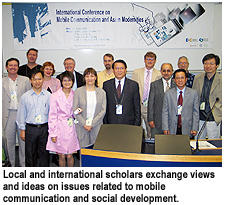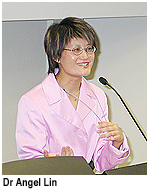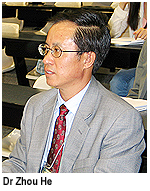Scholars explore how mobile communication shapes modern Asia
The mobile phone has fast become an integral feature of ‘modern’ life, giving rise to a rich dialogue over the past decade on the role of the mobile telephone in social, cultural and economic systems.Yet current research is dominated by western theories of modernity. So far, relatively little research has explored the use of mobile communication within
The aims of the Conference are three-fold: to examine and contrast Asian experiences with mobile telephones; to enrich general theories about the interaction of mobiles and society; and to use the phenomenon of mobile use in Asia to re-examine general concepts of modernity, globalization and culture. “Put simply, how do Asian peoples invent, produce, appropriate and use mobile communication technologies to explore and negotiate their own modernities,” Dr Lin said.
Two scholars from CityU presented papers at the Conference: Dr Lin analyzed how migrant workers in Southern China used mobile text messaging not only for information about jobs but also to create an alternative social space in which conservative sexuality and romance norms and practices could be relaxed and more liberal male-female social relations and interactions tried out.
Dr Zhou He, also an Associate Professor in the EN, discussed the development of the cellular phone in China from an interpersonal communication tool to a quasi mass communication channel; the spread of deviant expressions through it; the making of deviant discourse through SMS; the government’s control over SMS; and the implications of the role of SMS in the evolution of China’s increasingly plural political undercurrents in various discourse universes.
Participants of the Conference came from Australia, Bangladesh, France, Hong Kong, India, Italy, Japan, the Netherlands, the Philippines, Singapore, South Korea, Vietnam, and the USA, to discuss the growing body of research on how use of mobile phones both reflect and reshape society’s definitions of public and private spaces, work and home spheres, gender roles, adolescence, individuality, sexuality, political participation, etiquette, and social norms.
“This conference marks an important step in the progression of our understanding of the social and economic implications of the rapid spread of mobile communication around the globe,” said Dr Jonathan Donner, Post-Doctoral Fellow at the Earth Institute at


